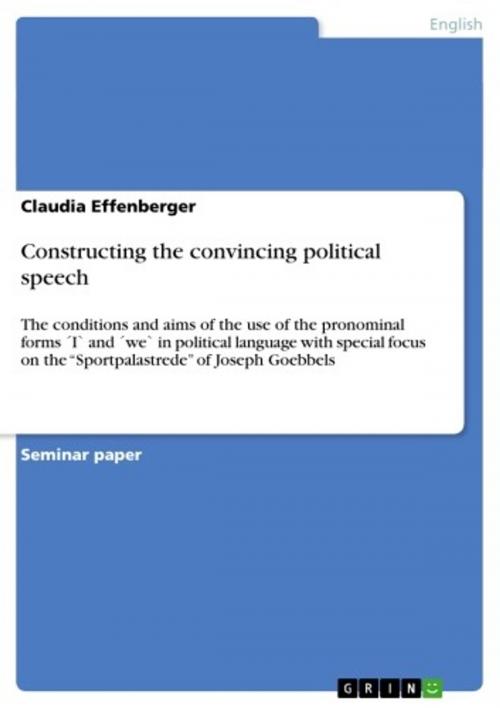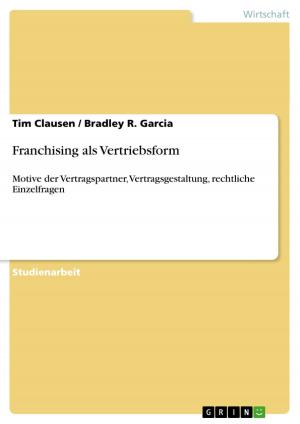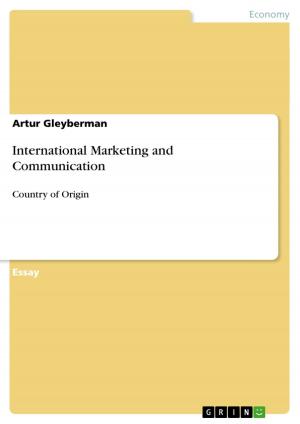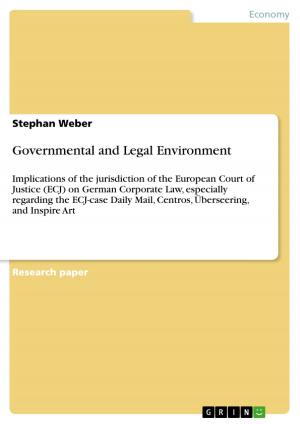Constructing the convincing political speech
The conditions and aims of the use of the pronominal forms ´I` and ´we` in political language with special focus on the 'Sportpalastrede' of Joseph Goebbels
Nonfiction, Entertainment, Drama, Anthologies| Author: | Claudia Effenberger | ISBN: | 9783640212231 |
| Publisher: | GRIN Publishing | Publication: | November 17, 2008 |
| Imprint: | GRIN Publishing | Language: | English |
| Author: | Claudia Effenberger |
| ISBN: | 9783640212231 |
| Publisher: | GRIN Publishing |
| Publication: | November 17, 2008 |
| Imprint: | GRIN Publishing |
| Language: | English |
Seminar paper from the year 2006 in the subject English Language and Literature Studies - Linguistics, grade: 1,0, University of Cologne (Englisches Seminar), course: Sociolinguistics, 8 entries in the bibliography, language: English, abstract: If today one thinks of politics, politicians and their language there is one opinion that always comes first: All politicians are liars They are smooth-talkers who promise things they cannot fulfil only to get more votes in the coming-up election and they use beautiful words to paraphrase and disguise social injustices. And in some points this opinion is right. There really is a specific political language used by the politicians to follow certain aims but this has not always to be disguise or circumscription. What many of the citizens simply ignore is the fact, that politicians are dependent from the mass. Without the public there would be no need for politicians. And the same goes for political discussions. Politicians don't argue with each other because they like it. It is always the fact that a political actor starts political relations with another actor and at the same time with the public. If two politicians talk to each other on the television this is always orchestrated for the people who watch the show. (see Dieckmann 1981: 265) The main reason for every politician to lie or to use special vocabulary is for the purpose of being convincing. This paper analyses the language used by politicians in certain situations to convince people of the correctness of their point of view, in its' roots, mainly based on the book Politically Speaking: The Pragmatic analysis of Political Language by John Wilson. The main focus of this paper is put to the question of the use of the pronominal forms ´I` and ´we` in political talk, under which conditions the one is used and when the other and what for. It is not arguable that politicians always have a reason for using ´I` or ´we` in different contexts, especially in written speeches that are planned and very well prepared. Also the difference between scripted and unscripted speeches will be touched in this paper. To employ the theoretical basis that is provided here, in the last section the famous 'Sportpalast'-speech of Joseph Goebbels from 1943 will be analysed with regard to the use of different pronominal forms. The final summary shall bundle the gained information to a logical minimum and draw some conclusions from it. It will show if political use of speech is intentionally manipulating and disguising facts, especially in the example of Goebbels or if the use of language in politics does not differ in great parts from the day-to-day use at home.
Seminar paper from the year 2006 in the subject English Language and Literature Studies - Linguistics, grade: 1,0, University of Cologne (Englisches Seminar), course: Sociolinguistics, 8 entries in the bibliography, language: English, abstract: If today one thinks of politics, politicians and their language there is one opinion that always comes first: All politicians are liars They are smooth-talkers who promise things they cannot fulfil only to get more votes in the coming-up election and they use beautiful words to paraphrase and disguise social injustices. And in some points this opinion is right. There really is a specific political language used by the politicians to follow certain aims but this has not always to be disguise or circumscription. What many of the citizens simply ignore is the fact, that politicians are dependent from the mass. Without the public there would be no need for politicians. And the same goes for political discussions. Politicians don't argue with each other because they like it. It is always the fact that a political actor starts political relations with another actor and at the same time with the public. If two politicians talk to each other on the television this is always orchestrated for the people who watch the show. (see Dieckmann 1981: 265) The main reason for every politician to lie or to use special vocabulary is for the purpose of being convincing. This paper analyses the language used by politicians in certain situations to convince people of the correctness of their point of view, in its' roots, mainly based on the book Politically Speaking: The Pragmatic analysis of Political Language by John Wilson. The main focus of this paper is put to the question of the use of the pronominal forms ´I` and ´we` in political talk, under which conditions the one is used and when the other and what for. It is not arguable that politicians always have a reason for using ´I` or ´we` in different contexts, especially in written speeches that are planned and very well prepared. Also the difference between scripted and unscripted speeches will be touched in this paper. To employ the theoretical basis that is provided here, in the last section the famous 'Sportpalast'-speech of Joseph Goebbels from 1943 will be analysed with regard to the use of different pronominal forms. The final summary shall bundle the gained information to a logical minimum and draw some conclusions from it. It will show if political use of speech is intentionally manipulating and disguising facts, especially in the example of Goebbels or if the use of language in politics does not differ in great parts from the day-to-day use at home.















